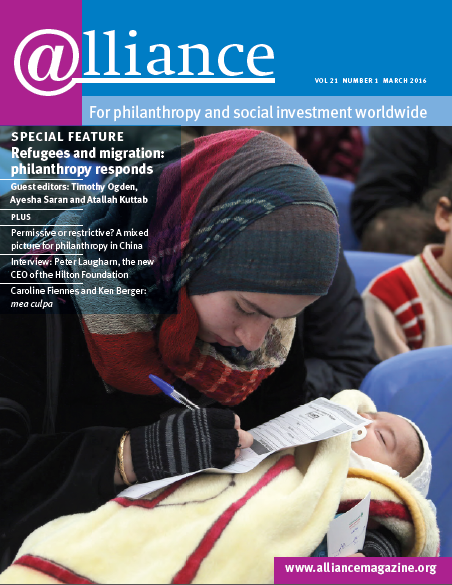So much trouble in the world.
Sixty million people have been forced to leave their homes. Twenty million have fled their country of origin. Around 1.5 million landed on the shores or crossed the borders of the European Union in 2015.
International institutions such as the EU and UN were founded to safeguard peace, stability and prosperity. Today, they endeavour but often struggle to create frameworks and policies to handle the needs of both migrants and destination countries. With notable exceptions, these institutions have not been helped by countries looking inward as they seek to protect their own borders and resources.
Yet, it is generally agreed that states have obligations, legally and ethically. What happens when states and international institutions fail to act? Or act in a way that causes or exacerbates the problem? Does philanthropy – the literal meaning of which is a love of humanity – hold the promise of alleviating human suffering?
This edition of Alliance asks how philanthropy should respond to the issues posed by refugees and migration.
Some of the questions explored include: which areas should foundations focus on? Should they press states and international institutions to fulfil their statutory responsibilities? Or should foundations just be thinking harder about their own? For example, should they address the disproportionate impact on women? Should they seek to change public attitudes? Should they help with absorbing and integrating new arrivals? Moreover, are we too western-centred in our response? We react to the affront caused by children drowning on our shores but what about the children drowning further away not just unsaved but unseen? And even if we did address the problems of refugees and migration, what about other challenges facing humanity such as climate change? Philanthropy carries a big burden.
This issue also features an important contribution to the debate about how to measure the impact of non-profits by Caroline Fiennes and Ken Berger. Their mea culpa shatters the consensus that non-profits should be responsible for measuring their own impact. Instead, they argue, work would be better undertaken by independent specialists if we want reliable and high quality data.
We also hear from Peter Laugharn, the new head of the Hilton Foundation, who talks about the work of his foundation and what it’s like to be a non-family member in a family philanthropy. Meanwhile, reports from the US and China examine the ways in which the space for philanthropy is changing.
This edition arrives with you at a time of transition for Alliance. In addition to thanking our guest editors and community of contributors, I would like to pay tribute to the Alliance team including general manager David Drewery, editors Laura McCaffrey and Andrew Milner and, most of all, Alliance’s longstanding former editor, Caroline Hartnell, for her ongoing support. This issue would not have been possible without them.
I hope you enjoy the outcome of our combined efforts.
Charles Keidan is acting editor at Alliance.





Comments (0)